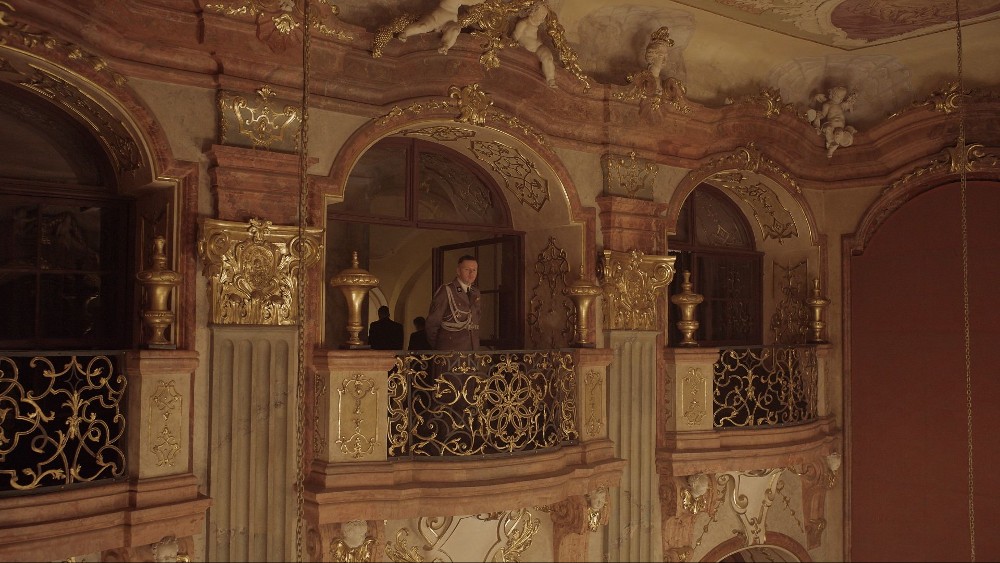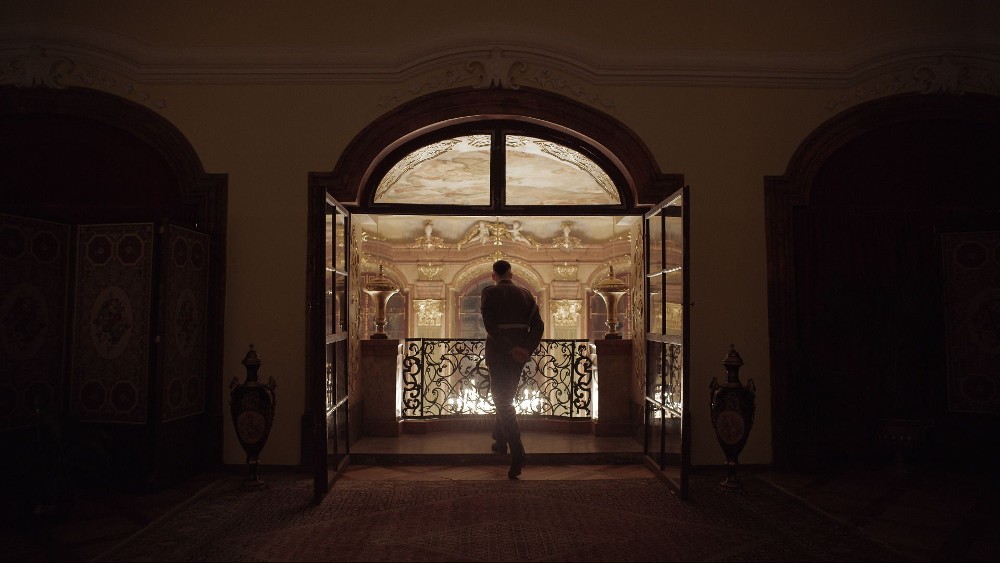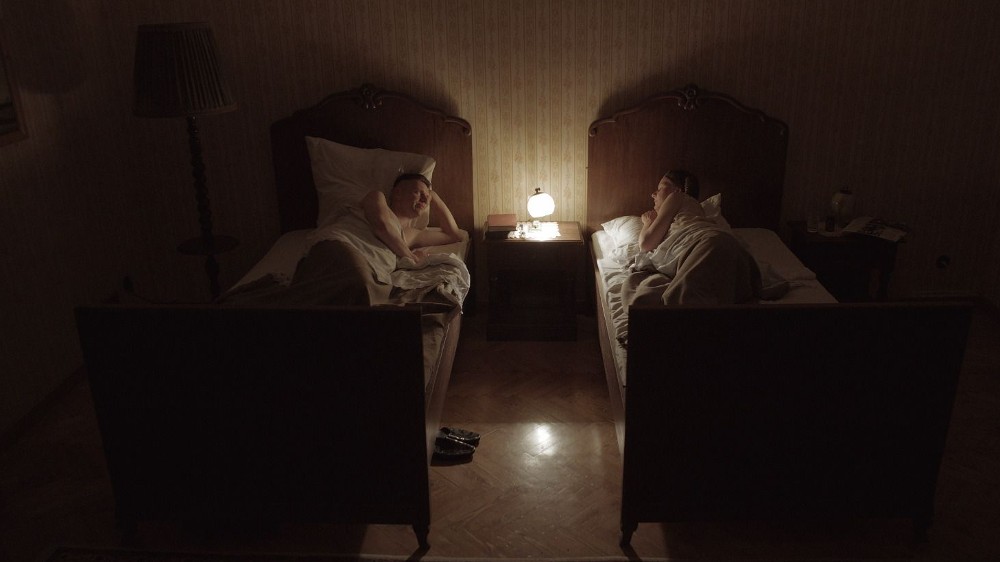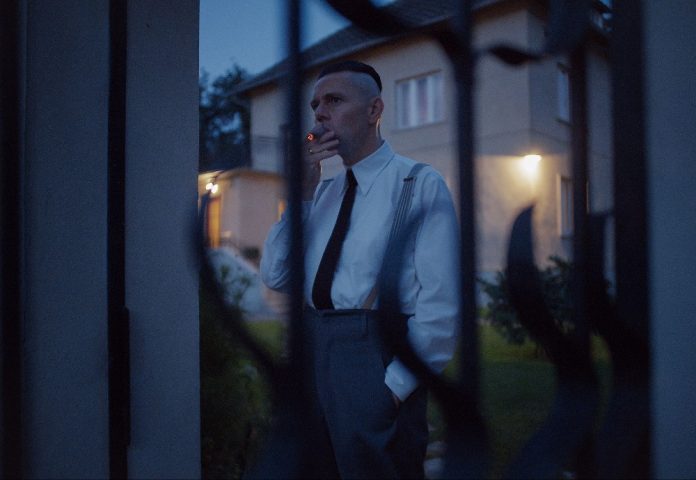One of 2023’s most effective and haunting films is director Jonathan Glazer‘sThe Zone of Interest. The United Kingdom’s official Oscar entry for Best International Feature is based in part on the 2014 novel by Martin Amis and centers around Auschwitz Commandant Rudolf Höss, who lives with his family right outside the gates to the infamous concentration camp. Glazer’s film never takes audiences over the gates to see the horrors being perpetrated there at Höss’ direction, leaving those to the imagination with disturbing sounds of gunfire and screams and smoke billowing in the background.
Instead, The Zone of Interest presents Höss as a devoted father to his children and his wife Hedwig, played by Sandra Hüller (Anatomy of a Fall), who cares far more about keeping up her well-manicured garden than she does about anyone else’s suffering. German actor Christian Friedel took on the arduous task of portraying Höss as someone who feels that he is carrying out an important and sacred duty, one that involves, among other things, meeting to discuss a way to gas prisoners at a quicker and more efficient rate.
Above the Line had the chance to speak with Friedel, whose film debut was fourteen years ago in the Oscar-nominated The White Ribbon. He shared memories of working with acclaimed director Michael Haneke and how his first film relates to his latest, which afforded him the opportunity to work with Glazer, about whom he has much to praise. He shared the emotional impact of filming very close to Auschwitz and how much he wanted to be able to connect with the real man he was playing.

Above The Line: What did you want to know about this man that you were portraying?
Christian Friedel: That’s a good question, because we didn’t want to make a biopic or something. It was more interesting, what we see in Jonathan’s vision, what we were searching for. It was more [about] the normality, the banality of this family and this character. I wanted to know, what are his interests? We see he was interested in nature. He was interested in horseback riding. He likes – he loves – his children. He was always interested in being the best at his work, and I had to always keep this in his mind. I was searching for body language to create this character and to dive into situations from the script, and it was not so important for me to have all the background, psychologically, in my head. It was more about being spontaneous. Because of this multi-camera system, you had the chance to do a lot of variations. It was allowed to be boring, or sometimes it was allowed to make mistakes, or to figure it out, to have a feeling, to trust your instincts. That was more important than to know so much about his life.
ATL: You mentioned body language. There’s a certain way that he walks, that he even just turns off lights at night or that he takes his boots off and walks around the house. Does wearing that uniform and being in that space really affect your performance?
Friedel: Absolutely. The uniform wears the man, not the man wears the uniform, Jonathan said. And it’s changed you and it fits you. It was really smart for the propaganda team from the Nazis to have such a thing that you can think, “Okay, I’m a better person or I’m higher up and I have power.” To know or to believe that he is in charge and that he has power, that changes your body too. It was really helpful to have this beautiful haircut, to have this uniform, to dive from the outside into the inside. What you mentioned, the scene with the lights, for me, this is the scene where we really see him. He closes all the doors like a daily routine, but this is what he’s thinking. He compartmentalizes all these things and he wants to protect something. Jonathan said it too, it’s his favorite scene of my character. I really like the scene too, because there’s a special rhythm, and this is him. We see how he’s thinking and his world in a metaphorical way.
ATL: He also wears that white suit when he seems just as much in charge, but he’s considerably more relaxed, if that’s possible.
Friedel: That’s not possible, because inside of him, he will never be a relaxed person. This white suit is great, because white stands for innocence. But he is not innocent. He is the opposite of that. But it wears him too. It’s a casual thing, but inside of him, he’s still thinking of his work, and he still has intention. I like these two costumes very much. The uniform helps him to have an interesting commandant body language. With the suit, he tries to be someone from a higher class or someone important, but he isn’t this person, and it’s really interesting to have this contradiction.

ATL: You mentioned that he loves his family. Did you want or try to find ways to humanize him?
Friedel: This is a really good question, because my challenge was not to be the perpetrator in a cliché way. It was important that we don’t see the perpetrator in action. We know he is this man, this commandant, he is the head of this immense crime. But there is some softness inside of him. We had a Q&A in the cinema here in LA, and a woman from the audience said to me, I felt that there’s some kindness in him, and I was surprised about this little thing inside of him. Maybe it’s really deep inside of him, but he really doesn’t realize it, or it was destroyed in his childhood, or we don’t know. But there’s something I was searching for to give this evil person a human face. For example, to say goodbye to his horse with some tears in your eyes. He’s very touched because his life is changing and he doesn’t know what’s going on and what will happen. This is really human, a human feeling, and I was trying to connect my emotional archive in some specific situations with this character. It was necessary to do this even if I cannot say that I understand him or his actions. I will never do this. I will never understand that a family lives next to this murderer camp and Daddy says, I go to work, and then he kills millions of people. But I understand him sometimes as a father, as a human who’s interested in nature. I was trying to connect this with my emotions so that we understand him.
ATL: What was the emotional impact of filming so close to the real Auschwitz?
Friedel: It was really intense, because we were very close to the camp, I think one hundred meters or something, and very close to the original house. I had one scene in the basement of the original house. To be in the original house and to look in through the window and to see how close the gas chamber was, that was really unbelievable. I visited the camp for the first time before shooting, and I had this haircut, and it was embarrassing. I wore a hat. It was hot, but I was so ashamed. To be there and to know, that was really intense. It was really emotional, and as a human being, as Christian, I was really emotional. I remember that we had dinner with Jonathan and Sandra and the producer, Jim [Wilson], and I started to tell a story about my late mom. I was so full of emotion, but when we were shooting, we were concentrated on important things. But in your free time, you felt, “Oh my God, this is where I am.” That was really intense. One time, I was in a beautiful little café in a marketplace, and I had free time, so I did some work stuff. I forgot where I was, and I realized how easy it is to forget sometimes to protect yourself, because it’s so intense and emotional, but it had an impact, and I’m really grateful that we were there.
ATL: This is a very important film and an excellent performance from you, but what does playing a Nazi do for your career going forward? Does it show that you’re a good actor, or does it risk people associating you only with this role?
Friedel: I think the most important thing was working with Jonathan Glazer. For me, he’s one of the visionary directors who really inspired me. He invites you to work with him, you are not an object he’s using. No, he invites you to work with him. That was the next step for me in my career, because this inspires me as an actor and as a human being too. I was waiting a long time to play a Nazi. I was involved in so many historical movies. Michael Haneke said to me, “You have a historical face. Maybe this is the reason that people think, ‘Let’s do it with Christian!'” I played a Jewish character. I played a resistance fighter. I played a schoolteacher in The White Ribbon. I was really surprised about Jonathan’s vision, but I just thought, it’s so important to do this, and if you look at this work now and the difficult political times we are living in, it’s great that we have this movie as a mirror, mirroring ourselves in a way.

ATL: In The White Ribbon, there’s no mention of Nazis. It’s early, years before that, but there’s still this undercurrent of the evolution of that coming. Do you see a connection between these two films?
Friedel: Absolutely. That was my first film. The children from The White Ribbon could be the future perpetrators from The Zone of Interest. There are also, artistically, some connections. In The White Ribbon, there is a scene where we watch a door, and we hear the sound behind the door. I think this is a connection to The Zone of Interest too, because what we see and what we hear are such different things. I think what we hear is so important for The Zone of Interest emotionally and you have all these familiar pictures in your mind. Even in in The White Ribbon, sometimes it’s stronger not to see, only to hear. Haneke said to me, your ears never lie but your eyes will always lie. He was sitting next to the camera, and he closed his eyes, and he only listened to our performances. I think that Jonathan, with all his senses, did the same. He was listening, because he doesn’t speak German, but he understands us. Art is a unique, universal language we all understand, and that’s great.
ATL: What was it like working with Sandra, and what was your approach to build this couple’s relationship?
Friedel: Sandra and I, we met twelve years ago. We worked together on the feature film Amour Fou from Jessica Hausner. I played Heinrich von Kleist, and she played my cousin. We met, and from the first minute, we had a connection. Maybe it was because we both grew up in East Germany, I don’t know. But it’s so rare to find someone you trust from the very beginning, and we became friends. It was really helpful, because we listened to each other, and sometimes with acting, it’s making music together. It was really great to have her at my side. Here we are now in Hollywood, and it’s all crazy, and Sandra is on everyone’s mind. It’s crazy times and it’s great that we are together again. To be here as friends was really great. She’s an inspiration for me. To watch her act, the scene at the river, with her monologue, it’s one of the strongest scenes in the movie, and it was an inspiration for me.
The Zone of Interest is currently playing in New York and Los Angeles.



